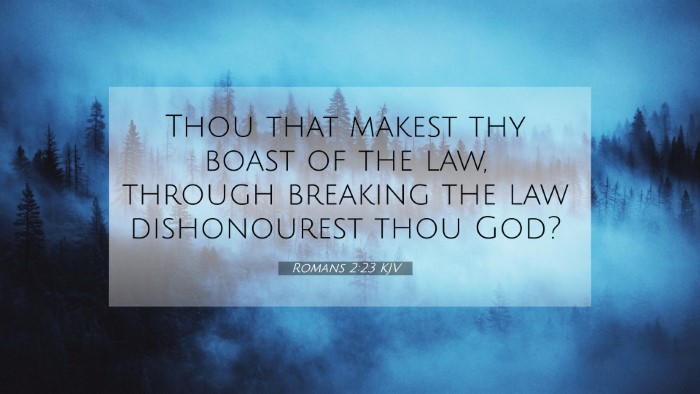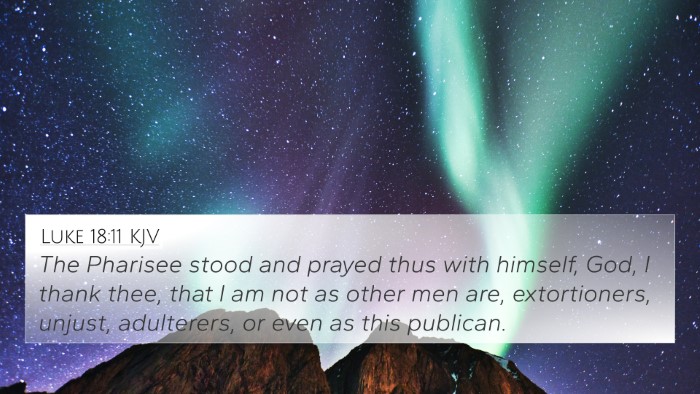Understanding Romans 2:23
Romans 2:23 states: “Thou that makest thy boast of the law, through breaking the law dishonourest thou God.” This verse addresses the hypocrisy of those who pride themselves in their adherence to the law while failing to live according to its true intentions.
Context and Meaning
The Apostle Paul, in the book of Romans, emphasizes that the law serves not only as a standard of conduct but also as a reflection of one's relationship with God. Paul argues that simply possessing the law or boasting about it does not exempt individuals from its demands.
Key Insights from Public Domain Commentaries
-
Matthew Henry:
Henry highlights that the verse points out the folly of those who trust in the law for their righteousness while neglecting its moral imperatives. He elaborates that such boasting ultimately leads to dishonor toward God, who desires obedience over mere knowledge.
-
Albert Barnes:
Barnes explains that the verse serves as a sobering reminder that all who claim to know God’s law must also live it. He notes the danger of hypocrisy, where one's external adherence does not translate into true faith or righteousness.
-
Adam Clarke:
Clarke points out that Paul critiques both Jews and Gentiles in this verse, emphasizing the universal need for genuine faith expressed through behavior. He affirms that true honor to God is found not merely in boastful claims but in the integrity of one’s actions.
Cross-References to Romans 2:23
This verse is interconnected with several passages throughout Scripture, illustrating the thematic connections between God's law and our conduct. Below are some key cross-references:
- James 2:10: "For whosoever shall keep the whole law, and yet offend in one point, he is guilty of all." This verse reinforces the idea that failing in one aspect of the law equates to failing entirely.
- Galatians 6:7: "Be not deceived; God is not mocked: for whatsoever a man soweth, that shall he also reap." This verse speaks to the consequences of one's actions, aligning with the dishonor mentioned by Paul.
- Matthew 15:8-9: "This people draweth nigh unto me with their mouth, and honoreth me with their lips; but their heart is far from me." Jesus emphasizes the difference between outward show and inward reality.
- 1 John 2:4: "He that saith, I know him, and keepeth not his commandments, is a liar, and the truth is not in him." This passage echoes the mismatched relationship between profession and behavior.
- Romans 3:20: "Therefore by the deeds of the law there shall no flesh be justified in his sight: for by the law is the knowledge of sin." Paul further clarifies that the law reveals sin rather than justifies before God.
- Matthew 7:21: "Not every one that saith unto me, Lord, Lord, shall enter into the kingdom of heaven; but he that doeth the will of my Father which is in heaven." This further emphasizes the necessity of action over mere verbal claims.
- Romans 6:1-2: "What shall we say then? Shall we continue in sin, that grace may abound? God forbid." This points out the expectation of a transformed life post-justification.
- Philippians 3:18-19: "For many walk, of whom I have told you often, and now tell you even weeping, that they are the enemies of the cross of Christ: whose end is destruction, whose God is their belly..." This warns against those who live contrary to the faith they profess.
- Luke 6:46: "And why call ye me, Lord, Lord, and do not the things which I say?" This questions the sincerity of those who do not act according to God's word.
Thematic Connections
The overarching theme found in Romans 2:23 through its cross-references speaks to the integrity of faith. Each reference contributes to an understanding of the biblical stance on performance versus profession. The connection between faith and actions is echoed throughout numerous books in the Bible, establishing a consistent doctrine regarding human accountability to divine law.
Harnessing Bible Cross-References for Deeper Study
For those seeking to deepen their understanding of Scriptures, utilizing tools for Bible cross-referencing can illuminate connections that might otherwise go unnoticed. Various methods can be employed:
- Bible Concordance: Use concordances to track specific words or themes in the Bible for related verses.
- Bible Cross-Reference Guide: Engage with reference guides that offer contextual links between verses.
- Cross-Reference Bible Study: Adopt a study approach that focuses on connected verses across different books.
- Organized Thematic Studies: Create thematic outlines to connect verses dealing with similar principles across the Old and New Testaments.
- Bible Reference Resources: Employ various reference resources to assist in identifying parallels and themes effectively.
Conclusion
In summary, Romans 2:23 is a critical reflection on the consistency required between one’s faith and actions. Utilizing cross-references and thematic connections enhances our understanding of the importance of living out God's law authentically. This verse serves as a poignant reminder that true honor towards God is demonstrated through obedience and integrity.













